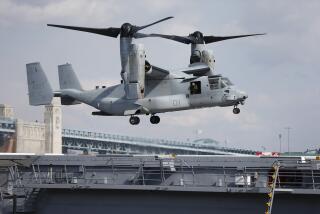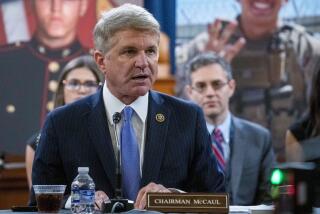2 in House Urge Halt to the C-17 : Aerospace: Defense Department probe of McDonnell’s cargo jet program finds ‘highly improper action’ on part of Air Force officials.
- Share via
WASHINGTON — The Air Force’s troubled C-17 cargo plane ran into still more difficulty Wednesday as two key House Democrats said the program should be halted and a Defense Department investigation concluded that several Air Force officials “engaged in highly improper action” in connection with the program.
Rep. John Conyers (D-Mich.), responding to an investigation by acting Defense Department Inspector General Derek J. Vander Schaaf, said there has been “intentional concealment” of damaging financial and technical information on the program. Conyers threatened to subpoena Defense Department officials to testify before his Government Operations Committee.
For the record:
12:00 a.m. March 19, 1993 For the Record
Los Angeles Times Friday March 19, 1993 Home Edition Part A Page 3 Column 6 Metro Desk 4 inches; 110 words Type of Material: Correction
C-17 aircraft--A report in Thursday’s Business section on the C-17 aircraft program misidentified two civilian Pentagon officials whose oversight of the program is under review by the Air Force, following the recommendation of the Defense Department inspector general. The officials in question, who had broad responsibility for the C-17 program in 1990, are Darlene Druyun, deputy chief of staff for contracting with the Air Force Systems Command, and Al Hixenbaugh, C-17 deputy director for contracting. The Times erroneously named Michael B. Donely, assistant secretary of the Air Force for financial management (and now acting secretary of the Air Force) and Eleanor Spector, director of defense procurement, as the officials whose management of the C-17 was under review.
Rep. John E. Murtha (D-Pa.), chairman of the House Appropriations Committee’s defense subcommittee, said at a breakfast with reporters that he would support canceling the C-17, McDonnell Douglas Corp.’s largest program.
“I think we will have to find some other way” to get troops and their equipment to hot spots throughout the world, Murtha said of the $42-billion program. “I have come to the conclusion we cannot afford it.”
Murtha’s subcommittee is one of two key panels in the House that controls funding for the C-17 and other weapons programs.
Halting C-17 production at this point would be politically difficult and very costly. The Air Force has already spent more than $8 billion developing the aircraft and has provided $1 billion in funding for the next 18 planes.
The erosion of support comes as the Defense Department considers whether to proceed with building the planned 120 aircraft. Throughout his election campaign, President Clinton gave strong support to the C-17, promising to proceed with production as a way to increase U.S. troop mobility and readiness to respond to Third World crises.
But Pentagon officials said the Administration has been dismayed by the extent of the C-17’s financial and technical problems and is considering deep cuts in the program.
In testimony Wednesday before Conyers’ committee, Vander Schaaf described a litany of troubles in development and early production of the cargo jet, ranging from huge cost overruns to quality-control problems that caused weakening of the plane’s wings. Recent Pentagon estimates indicate that McDonnell will exceed its contract to develop and build the first six C-17s by $1.2 billion.
Vander Schaaf said the entire C-17 program should be held up until the Defense Department “does a complete review.” He told the committee that “we found numerous similarities” between the management of the C-17 program and that of the Navy’s A-12 program, which was canceled by former Defense Secretary Dick Cheney after the Pentagon found evidence of deceit by program managers trying to cover up problems.
The A-12 was to have been built by McDonnell and General Dynamics Corp.
A recent report by Vander Schaaf on the C-17 recommended discipline for some of those involved in the program. In a letter to Conyers, Deputy Defense Secretary William J. Perry said the department is reviewing whether to punish two civilian Air Force officials and three Air Force officers cited by Vander Schaaf for possible misconduct.
Until that process has been completed, Perry told Conyers, it would be unfair to allow the five officials to testify before the House panel.
But Conyers demanded Wednesday that the Pentagon make the officials available to the committee by today and threatened to subpoena them if the Pentagon does not comply.
The officials are Michael B. Donely, assistant secretary of the Air Force for financial management; Eleanor Spector, director of defense procurement; Lt. Gen. Edward P. Barry; Maj. Gen. Michael Butchko, and Maj. Gen. John M. Nauseef.
More to Read
Sign up for Essential California
The most important California stories and recommendations in your inbox every morning.
You may occasionally receive promotional content from the Los Angeles Times.














